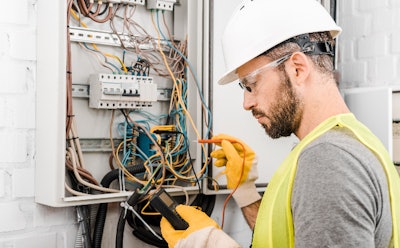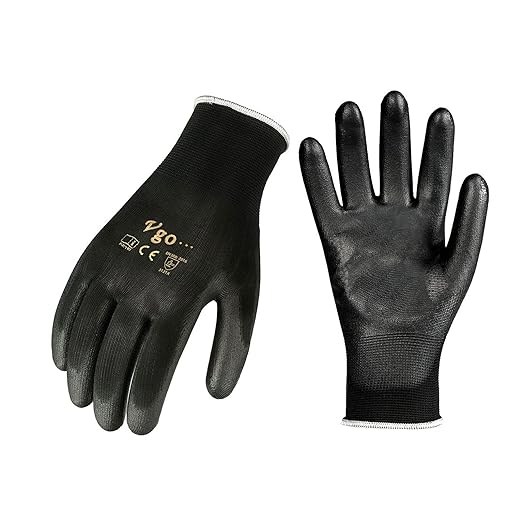
When you were assigned your first electrical job as a construction worker, you probably feared one aspect of it more than any other: potential shocks. But, as you learned from conducting more and more electrical-associated job tasks, shocks aren’t the only safety issue you must consider.
Nearly anything can happen as you oversee electrical jobs on your construction site. You could cut your hand, rather than a wire. A heavy material could fall on your hand, leading to broken bones or other significant injuries. You may even have blisters or burns, especially if you have to solder or weld.
Of course, work gloves can’t prevent every single potential injury. But they certainly can help minimize your risks, decrease your downtime and ensure you remain as productive as possible as you’re assigned your next electrical job.
Why Buy Electrical Gloves?
Electrical gloves are often comprised of various materials. For the highest potential of enhanced safety, IronPros recommends leather or rubber gloves. After all, they’re more prone to protect you from high voltage, as they will restrict the amount of electrical flow that enters your body.
You should ensure they comply with certain safety standards, such as ASTM F696. In addition, you must determine the amount of voltage the gloves will protect you from. If you use them for jobs that have higher voltage than recommended, you’ll be as prone to injuries as you would have been without them. Furthermore, it’s important to remember that, for the most part, rubber gloves will protect you from high voltage, while leather gloves will protect your rubber gloves from abrasions.
Leather gloves will also protect your hands from cuts and impact injuries (again, anything can—and likely will—happen on the jobsite as you conduct electrical work). And, aside from protecting you from numerous work-related injuries, leather gloves will also protect you from a variety of elements, whether you’re working in high heat as you solder and weld or you’re working in the midst of winter.
The bottom line? To remain protected from several on-the-job circumstances, the following five gloves offer you an assortment of safety-related benefits.
Coolneon Electrical Gloves

Coolneon Electrical Insulated Gloves.
Comprised of rubber, these gloves will protect you from voltage that’s as high as 12kVAC/22kVDC. This high protection is due to two primary features: their rubber composition and their thickness, as they’re 0.07 inches thick. Due to this thickness, they can’t typically be utilized for electrical tasks that require high nimbleness. However, they can still be used for a variety of electrical tasks, including electric meter replacements and thicker wire installations. To ensure they protect you from high voltages long term, you should have them tested every six months. And, to remain protected from punctures, you should also consider wearing leather gloves underneath them.
Best Features: Protection from high voltage (up to 12kVAC/22kVDC); thick design
Price: $19.99 – Buy electrical gloves on Amazon.com
Klein Tools 40072 Electrical Gloves

Klein Tools 40072 Electrical Gloves.
According to the manufacturer, these gloves are “designed by electricians for electricians”. As a result, they have many features that will be beneficial for you, as you conduct electrical work on your construction jobsite. First, due to their palm and finger material, they’ll offer you slip resistance as you pull cables and wires. Highly durable, as a result of this material, along with their wrapped index fingers, the gloves, in turn, can be utilized for long durations. In fact, they’ll maintain their durability even if you conduct a wide range of challenging tasks—which often lead to wear and tear—with them.
Best Features: Slip resistance; wrapped index fingers
Price: $18.89 – Buy electrical gloves on Amazon.com
PiPiAnAn Electrical Insulated Rubber Electrical Gloves

PiPiAnAn Electrical Insulated Rubber Gloves.
As a result of their ergonomic contoured shapes, these gloves will reduce your chafing, along with your overall hand fatigue. Particularly ideal for electrician lineman job tasks, as well as high-voltage machine operations, the gloves have been tested under 20KV. However, as you use them on your jobsite, you must ensure that voltage never rises above 10KV, in order to remain safe at all times. Comprised of dielectric natural rubber, the highly durable gloves are also thick and heavy, leading to their safety, even as you conduct high voltage tasks. Non-conductive, highly elastic and resistant to various punctures, the gloves typically have long lifespans.
Best Features: Ergonomic contoured shapes; non-conductive
Price: $31.55 – Buy electrical gloves on Amazon.com
Vgo... Safety Work Electrical Gloves

Vgo... Safety Work Gloves.
Due to their 45-degree angle cuts at their finger junctions, along with their pre-curved fingers, these gloves will provide you high breathability, comfort and flexibility as you conduct your electrical jobs. Offering customized fits too, they’ll fit various hand sizes and, in turn, protect a wide array of construction workers. Comprised of leather, the gloves offer high longevity as well, as they’re very resistant to abrasions and tears, thereby protecting your hands from potentially long-term injuries. Available in six sizes, ranging from small to extra-extra-large, the gloves can be worn as you use your smartphone since their thumbs and index and middle fingertips are touchscreen capable.
Best Features: Abrasion resistance; touchscreen capable fingertips and thumbs
Price: $29.98 – Buy electrical gloves on Amazon.com
Things to Know about for Electrical Gloves
How often should I retest my rubber electrical gloves to ensure they’ll protect me from high voltage?
According to OSHA’s Table I-5, they should be tested before they’re first used and then tested every six months after that, thus guaranteeing users’ safety.
What about electrical gloves that been tested, but never used? What should I do before I use them for the first time?
If they’ve been electrically tested at some point in the past, but not used before, they may not be utilized until you can verify that they’ve been tested within the past 12 months.
What should I do after I use my electrical gloves?
They must be properly stored and cleaned, especially if you have rubber gloves. You should consider cleaning them with soap and then rinsing them with water if they’re dirty. Afterwards, you’ll need to air dry them, prior to storing them in a bag (or another item that protects them). Ensure they aren’t folded or creased, if at all possible.
If you have leather gloves, you can be more flexible. Ensure you clean them as soon as you can, dry them fully and then prepare to use them again. By cleaning them when necessary, the gloves, which are built for longevity, will maintain their durability for a longer period of time.















